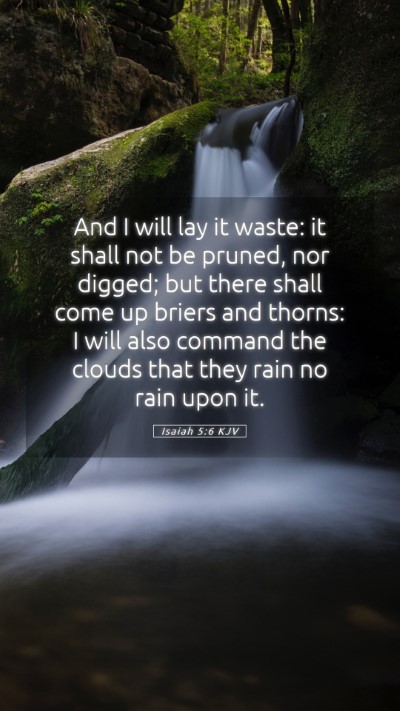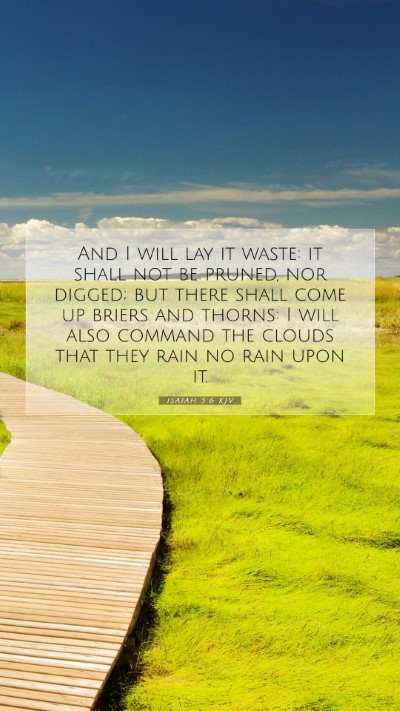Understanding Isaiah 5:6: A Comprehensive Bible Verse Commentary
Isaiah 5:6 states, "And I will lay it waste: it shall not be pruned, nor digged; but there shall come up briers and thorns: I will also command the clouds that they rain no rain upon it." This verse is a critical part of the prophetic vision of Isaiah, focused on themes of judgment and the consequences of unfruitfulness.
Overview of Isaiah 5:6
This verse serves as a dire warning about the fate of Judah, a metaphor for God's people who have strayed from righteousness. As we delve into the meanings and interpretations provided by public domain commentaries, we can further illuminate the depth of this scripture.
Bible Verse Meanings
- God's Judgment: The prophetic words indicate a serious consequence for Israel's lack of faithfulness, emphasizing the theme of divine retribution.
- Symbolism of Thorns: The mention of "briers and thorns" symbolizes not only dereliction but also the presence of sorrow and trouble that will prevail in the absence of God's nurturing care.
- Lack of Spiritual Nourishment: The verse highlights that without God's rain, which symbolizes blessings and spiritual growth, the land (God's people) withers away.
Bible Verse Interpretations
According to Matthew Henry, this verse signifies the utter destruction that awaits those who fail to yield good fruits. Henry emphasizes that God’s judgment represents a withdrawal of His grace and protection:
"When God takes away the means of grace, the soul becomes desolate and unfruitful."
Albert Barnes expands on this idea by discussing the agricultural imagery presented in Isaiah, where pruning and digging represent God’s desire to cultivate and nurture His people:
"To prune is to tidy and cultivate; however, in this case, the vineyard is left to itself, resulting in inevitable decay."
In-Depth Scripture Analysis
According to Adam Clarke, the act of withholding rain is particularly poignant, representing spiritual drought. Clarke illustrates this by drawing parallels with the natural world:
"Just as a land devoid of rain suffers from drought, so too does a heart deprived of divine nurture become barren."
Application of Isaiah 5:6 in Daily Life
This verse challenges us to reflect on our spiritual lives:
- Spiritual Vigilance: Believers are urged to remain vigilant in their relationship with God, avoiding complacency that can lead to spiritual barrenness.
- Seeking God's Nourishment: Continuous prayer and seeking God's word are vital for receiving spiritual rains that promote growth.
- Accountability: Community accountability can act as a measure to ensure that individuals do not stray from nurturing their faith.
Related Bible Verses
- Jeremiah 4:27 - A parallel warning of desolation due to unfaithfulness.
- Matthew 21:19 - Jesus curses the barren fig tree, illustrating judgment for not bearing fruit.
- John 15:2 - The true vine metaphor, highlighting God's role in pruning believers for fruitful living.
Conclusion
Isaiah 5:6 embodies profound insights on the repercussions of spiritual unfruitfulness. By understanding its biblical context and its implications for our lives today, we gain a valuable perspective on the necessity of remaining connected with God through prayer, scripture study, and genuine faithfulness. This promotes a fruitful spiritual life that God desires for His people.


